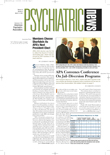Only about 20 percent of patients prescribed a medication to treat depression have at least three recommended follow-up visits to monitor their medication in the 12 weeks after diagnosis.
Moreover, half of the people with depression stop using their medication within the first month.
Those were among the findings from the “National Healthcare Quality Report,” issued by the federal Agency for Healthcare Quality and Research last December. The report was accompanied by the “National Healthcare Disparities Report.” Together, the two reports document the quality of American health care and the differences in use of services across the population.
The reports presented data on the quality of, and differences in the access to, services for seven clinical conditions, including depression. The other conditions were cancer, diabetes, end-stage renal disease, heart disease, HIV and AIDS, and respiratory disease. The reports also included data on maternal and child health, nursing home and home health care, and patient safety.
“Limited progress is being made in quality of medication treatment [for depression],” the AHQR stated. “About 60 percent of depressed patients do not receive the acute-phase treatment they need, and about 40 percent do not receive the continuous-phase treatment they should have. Moreover, these rates have not improved over the three-year period that these measures were tracked (1998, 1999, and 2001; data were not available in 2000).”
The report found that in 1999, almost 59 percent of adults diagnosed with a new episode of depression received a continuous trial of antidepressants through the acute phase of treatment, but in 2001 that dropped to less than 57 percent. The percentage of adults who remained on antidepressants through the continuation phase of treatment dropped from 42 percent in 1999 to 40 percent in 2001.
The AHQR used three measures to determine quality of depression treatment:
• Percent of adults who had at least three follow-up office visits with a primary care or mental health provider in the 12-week, acute-treatment phase after a diagnosis of depression and prescription of antidepressant medication.
• Percent of those adults who received a continuous trial of medication treatment during the acute-treatment phase, defined as the period immediately after a new episode.
• Percent of adults who were diagnosed with a new episode of depression, started on an antidepressant drug, and remained on medication through the continuation phase, defined as the six months following initial diagnosis and treatment.
The “National Healthcare Quality Report” and the “National Healthcare Disparities Report” are posted online at www.qualitytools.ahrq.gov. ▪
